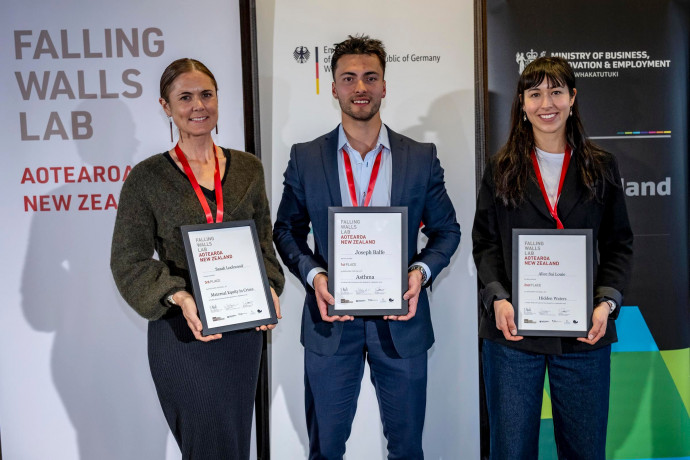News
Published 13 September 2024Wearable asthma tech, groundwater monitoring and maternal care the winning topics of 2024 Falling Walls Lab Aotearoa New Zealand

Wearable-tech for treating asthma with nerve stimulation, novel ground water monitoring and supporting maternal care during emergencies were the winning topics of the 2024 Falling Walls Lab Aotearoa New Zealand pitch competition.
Joseph Balfe, Pacific Edge Ltd / University of Otago, was the overall winner for his wearable smart-device to detect and relieve asthma attacks through opening the lung airways with nerve stimulation.
Alice Sai Louie, Lincoln Agritech Ltd / University of Canterbury placed second for her innovation of repurposing existing fibre optic telecommunications networks with distributed temperature sensors for real-time groundwater flood monitoring.
Sarah Lockwood, Te Wānanga o Aoteaora, placed third for her development of a practical framework for health and crisis practitioners to support maternal equity during crisis events.
These three winners were selected from nineteen participants from around Aotearoa New Zealand and the Pacific Island Nations who pitched their innovative breakthrough ideas at the Falling Walls Lab Aotearoa New Zealand event held by Royal Society Te Apārangi this week, with support from the German Embassy in Wellington, the Ministry of Business, Innovation and Employment (through the Catalyst Fund) and EURAXESS Australia & New Zealand.
The participants each had the opportunity to showcase their innovative research, scientific idea, or evidence-based initiative, and explain how it could make a difference for society in a three-minute presentation.
As the winner of 2024 Falling Walls Lab Aotearoa New Zealand, Joseph has won the chance to represent the region and compete at the Falling Walls Lab Global Finale in Berlin in November.
As part of his prize, EURAXESS Australia & New Zealand will offer him mentoring and science communication training, to make sure he will get the most of out his trip to the Falling Walls Lab and Science Summit in Berlin.
See more about the winners and watch their winning pitches:
Breaking the Wall of Asthma
Joseph Balfe, Pacific Edge Ltd / University of Otago
Every day, the lives of more than 1000 people are cut short because of an asthma attack, and most of these deaths are preventable due to a simple delay in obtaining inhaled medications during the final attack. Because of this, we are developing a smart, wearable, bronchodilator device that can detect and rapidly intervene during asthma attacks using advanced neuromodulation technology.
Joseph is a Clinical Trials Associate at Pacific Edge Ltd., a world-leading cancer diagnostics company specialised in non-invasive genomic urine testing for bladder cancer. After completing a Bachelor of Music in Performance, Joseph pursued his science career, and recently completed a Master of Science with distinction in Neuroscience at the University of Otago. As an inventor of a patented neuromodulation device, he is committed to leveraging the therapeutic potential of neuromodulation technology to solve biomedical problems.
Related media release: Wearable tech asthma treatment wins 2024 Falling Walls Lab Aotearoa New Zealand
Breaking the Wall of Hidden Waters
Alice Sai Louie, Lincoln Agritech Ltd / University of Canterbury
Shallow groundwater flooding, exacerbated by climate change, threatens many low-lying, cities globally. We lack a high spatial resolution method to measure shallow groundwater over large areas. By repurposing existing, dark strands of fibre optic telecommunications networks with Distributed Temperature Sensing (DTS), measuring temperature could enable real-time groundwater monitoring of shallow groundwater dynamics across extensive regions, allowing for improved water management.
Alice is a research scientist at Lincoln Agritech Ltd, as well as a PhD candidate at the University of Canterbury. Alice’s current research focuses on surface water-groundwater interaction in braided rivers, investigating how river loss varies seasonally at a high spatial resolution. Her research uses heat as a tracer using novel Active-Distributed Temperature Sensing (A-DTS) methods. She is also interested in exploring new uses of fibre optic technologies for environmental sensing.
Breaking the Wall of Maternal Equity in Crises
Sarah Lockwood, Te Wānanga o Aotearoa
My research project examines the experiences of pregnant women during a climate crisis and uses this information to build a practical framework for health and crisis practitioners to utilise in the attainment of maternal health equity. This responds to the increased occurrence of climate crisis events in Aotearoa and worldwide, whereby pregnant women are considered among the most vulnerable populations.
Sarah is a Senior Researcher at Te Wānanga o Aotearoa, specialising in social and cultural responses to crisis events. Sarah is currently leading a research project that addresses maternal health equity during a climate crisis. Sarah has lent her expertise to Pacific Island nations to help build local capacity to crisis response and is passionate about transferring academic research into community outcomes. Her PhD is from University of Waikato and MMS/BCS (Distinction/Hons) degrees are from University of Waikato and Sweden.
A special thank you to the expert jury who had the difficult task of selecting winners:
- Professor Phil Lester, Te Herenga Waka – Victoria University of Wellington (Chair)
- Associate Professor Riz Firestone, Massey University
- Associate Professor Alex Gavryushkin, University of Canterbury
- Associate Professor Tamasailau Suaalii-Sauni, University of Auckland
- Veronika Meduna, The Conversation
- Monique Surges, German-New Zealand Chamber of Commerce
Livestream
You can also view the full livestream of 2024 Falling Walls Lab Aotearoa New Zealand event. View programme.
Photographs
See photographs from the event.
